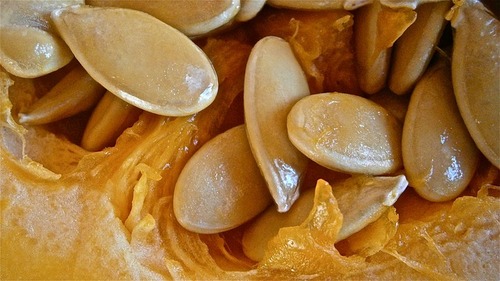Are Pumpkin Seeds Bad For You?
Also Known As: pepitas
Short answer
Pumpkin seeds are a good source of any different nutrients. They're high in sodium, however, and eating too much could overload your body with fiber.
Recommended Alternative
Very beneficial to your health. Things rated a 'B+' may have a few harmful qualities to pay attention to.
View Full Grading System
Category 'A'
Very healthy and numerous health benefits. Side effects are rare. Things rated an 'A+' are typically necessary for survival (for example, water).
Very healthy and numerous health benefits. A few harmful qualities may be associated, but only under certain circumstances such as an allergic reaction.
Very healthy and numerous health benefits. Harmful qualities may be associated, but aren't usually serious.
It is important to note that even the best things in life can become bad in immoderate amounts. So, although something may be rated an 'A+', overconsumption/overdoing can bring unwanted effects.
Category 'B'
Very beneficial to your health. Things rated a 'B+' may have a few harmful qualities to pay attention to.
Overall beneficial to your health. Things rated a 'B' may have some harmful qualities to pay attention to.
More beneficial to your health than not. However, harmful qualities are most likely associated and shouldn't be overlooked.
The main difference between category 'A' and category 'B' is the harmful qualities typically present in 'B' items. Serious side effects are usually uncommon, but are still possible and should be taken note of.
Category 'C'
Both beneficial and harmful qualities associated. Things rated a 'C+' are typically a bit more on the beneficial side. Still, moderation is important.
A fairly even ratio of beneficial and harmful qualities. Moderation is important. Very general topics that can lean towards both sides of the spectrum will be placed here as well. Rice, for example, can be good or bad depending on the type.
More harmful than beneficial. Side effects are common, especially when consumed/done excessively. Moderation is very important.
Category 'C' usually denotes to both good and bad qualities. When it comes to this category, it is important to keep this word in mind: moderation.
Category 'D'
Harmful to your health. Although benefits may be associated, the bad most likely outweighs the good. Moderation is very important.
Harmful to your health. A few benefits may be associated, but the bad outweighs the good. Moderation is extremely important.
Harmful to your health. Very few, if any, benefits are present. Things in this category should be avoided as much as possible.
Category 'D' is typically for things that are more harmful than beneficial. While consuming/doing something unhealthy once in a blue moon shouldn't hurt, we definitely recommend eliminating 'D' items as a regular part of your routine/diet.
Category 'F'
Category 'F' is for things that fail to bring anything beneficial to the table, and are very harmful to your health. We recommend completely avoiding anything in this category. Long-term side effects of 'F' items are usually very serious.
Category 'N'
'N' stands for neutral. Things placed into this category are generally (a) neither good nor bad for you, or (b) lack the necessary evidence to reach any conclusions.
Long answer
Pumpkin seeds are calorie- and nutrient-rich. They've got a lot of zinc, which is a boon for the immune system and the prostate. They're also distinguished by their high magnesium content - a mineral your body uses in a whole range of ways. Pumpkin seeds have omega-3 fats, which can boost your heart health in the right combination with omega-6.
Pumpkin seeds have a lot of calories, too - a cup clocks in at a staggering 1,200 calories. Although you're unlikely to eat a full cup, smaller portions of pumpkin seeds may still have more calories than most people are looking for. You can mitigate this by roasting the seeds; a cup of roasted pumpkin seeds provides about a quarter of the calories of the unroasted stuff. That's the way to go for those who are watching their calorie intake.
If you're eating roasted pumpkin seeds, however, you'll likely want to watch your sodium intake. Pumpkin seeds have a fair amount of sodium already; when they're roasted, salt is often added, which pushes the sodium up higher. Too much sodium over time can put you at risk of developing hypertension, high blood pressure, heart disease and other problems.
Pumpkin seeds are also a great source of fiber - especially if you chew up and eat the shells. That's good to a point; you need fiber to move food through your digestive system, soak up toxins and slow the rate at which your body absorbs sugars. Eat too much fiber, however, and you may experience the opposite effect; you could get diarrhea or experience bad constipation.
Almost all the fiber in pumpkin seeds, however, is found in the shell. If you're eating the kernels, the fiber content drops quickly to less than two grams. If you're worrying about going too crazy with the fiber dose, stick to the kernels and you should be fine.
Possible short-term side effects
Possible long-term side effects
- weight gain
-
effects from too much sodium
Ingredients to be aware of
Benefits
- promotes heart health
-
promotes prostate health
-
promotes liver health
-
promotes digestive health
-
supports immune system health
-
good source of plant-based omega-3s
-
anti-diabetic effects
-
anti-inflammatory effects
Our Wellness Pick
(what is this?)
Organic Pumpkin Seeds
- Premium quality
- Shelled and raw
- Unsalted
- Rich in nutrients
- Certified Organic
Learn More!
Please turn your Ad Blocker off to see this content. Thank you!

 Approved by
Approved by 















